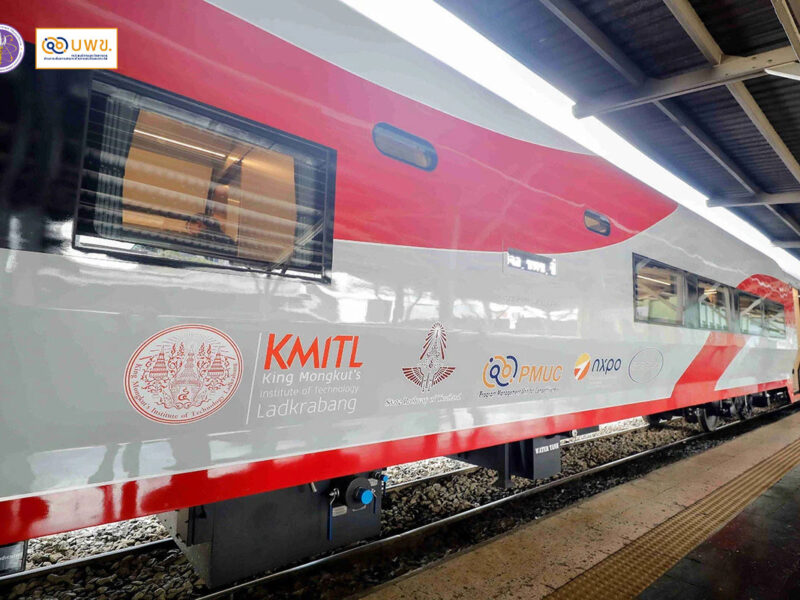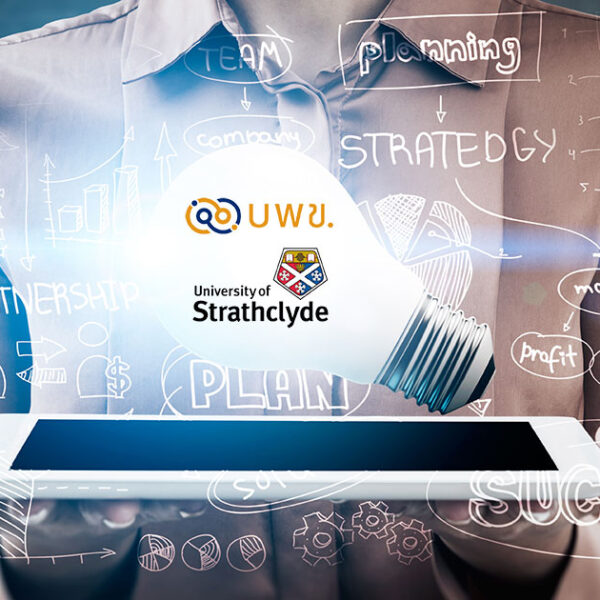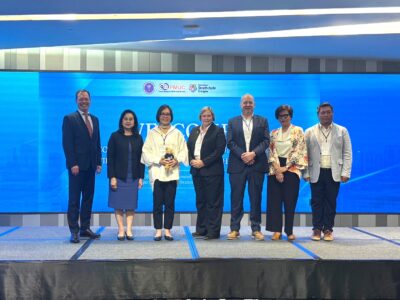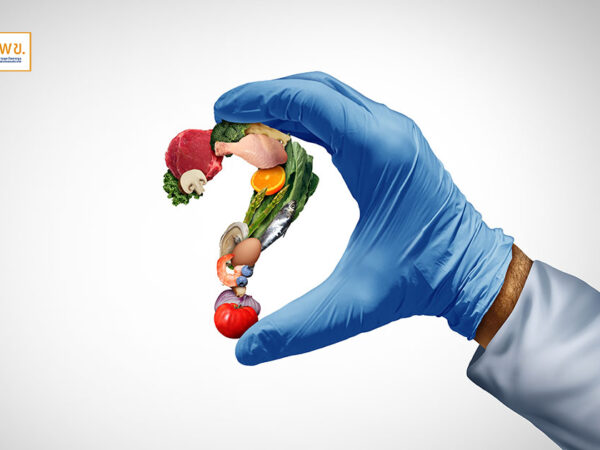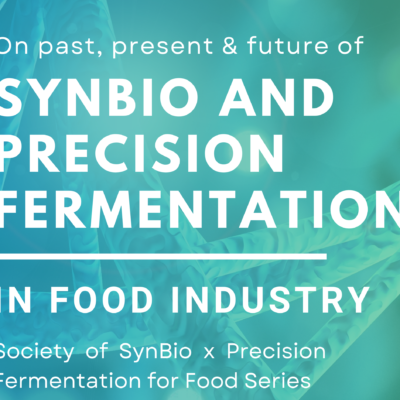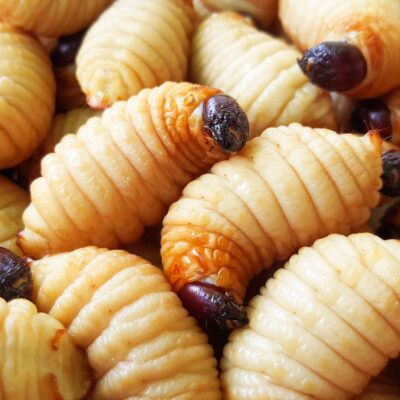
On March 5, 2021, at the Policy Office of Ministry of Higher Education, Science, Research and Innovation (MHESI), Chamchuri Square Building, 14th floor, Samyan, Bangkok, an event was hosted called “Tea Time… with PMUC #EP1” Increasing Thailand’s Competitiveness: In Health and Medicine” in a press conference to raise awareness and understanding about the origins and the mission of the PMUC, which aims to manage research funding to promote research that meets the industry emphasis on collaboration between the research community and the private sector, in order to provide research that has been transferred to commercial applications. The hope is to help elevate products and services to higher value levels, and ultimately to increase the country’s competitiveness.
Assoc. Prof. Siree Chaiseri, Ph.D., director of Program Management Unit for Competitiveness (PMUC), stated that PMUC is a capital management agency that promotes collaboration between the public and private sectors both inside and outside the country in order to bring science, technology, innovation and science to connect and integrate the value chain, creating a high-value product and service industry, building the country’s competitiveness, and promoting social, economic and environmental development in a sustainable way. The research scope is divided into seven frameworks: high-value agriculture in food, health and medicine; management of tourism and creative economy; chemical energy and biomaterials; digital platforms; circular economy; and area-based BCG, with an emphasis on reducing inequity and promoting income distribution in the regions.
In addition, in order to ensure that the research work will lead to concrete success, PMUC also provides funding for research plans in the area of technology driving mechanism as part of technology localization by way of research at the TRL5 level and above, such as the development by Thai researchers of prototypes or important technologies that have been designed, developed and built upon the foundation of leading technologies from abroad. These innovations have been tested for product performance and/or safety to create the capability to develop new technologies and innovative businesses that are well suited for the Thai industrial development context through real-world applications. Furthermore, PMUC serves as support in deep science & technology promoting research and driving in-depth innovation and technology research in order to attract investment in the industrial sector to commercialize high-value products and services. National Quality Infrastructure is another initiative to help in the area of investment planning necessary for government sectors that require urgent and continuous investment initiatives in order to achieve the goals that are set with an aim to maximize benefits for Thailand from such investments. Furthermore, Public-Private Partnership-Innovation Driven Enterprise (PPP-IDEs) is a support program that aims at leveraging the potential of small and medium-sized entrepreneurs in creating innovations, by using a cooperative mechanism between buyers (public and private) and SMEs to develop products or services to meet the specific needs of each particular agency, as well as linking existing knowledge base from large companies to smaller companies in the value chain to elevate the entire industry at the same time. Additionally a Global Partnership initiative that supports the development of international cooperation for the development of science, research and innovation throughout the country, resulted in the process of choosing relevant research and technology to be transferred in a strategic manner, which meets the needs of the country, creating research and innovations that can be used for both economic and social benefits, while reducing dependency on foreign technology in an effective and sustainable way.
“In the fiscal year 2020, PMUC received an approved budget for research funding totaling 3,170.83 million baht, of which 561.93 million baht has been used to solve COVID-19 related problems through research and development, producing SARS-CoV-2 assays using real-time RT-PCR (qPCR) method for health security; co-developing and producing test kits from prototypes developed by the Department of Medical Sciences; and producing 380,000 test kits to give to 14 medical science centers of the Department of Medical Sciences and related agencies; jointly researching and developing test kits to reduce the steps and time for testing by way of Extraction-free Real-time RT-PCR to achieve efficiency and convenience, as well as improving speed in reading the test results. The research team is also developing a color-changing lamp test kit for screening of the new strands of COVID-19, which is being tested for a wide range of applications to be integrated with the national disease control plan, and to be installed and used at the airport screening points and various hospitals. This rapid screening test gives results within 1 hour, thereby supporting more effective screening, leading to further control and prevention of the epidemic,” said Dr. Siree.




As for the performance of the High-value Agriculture and Food Program, PMUC has funded several important projects, such as the project of high-value products from organic mangosteen peel extract, xanthones, using advanced industrial chromatography technique. This is a research project of Kasetsart University together with Quality Plus Esthetic International Co., Ltd. to develop and expand the production capacity of high pressure liquid extraction machines for processing of organic mangosteen peels and commercial agricultural products, and to build upon the production of xanthones from mangosteen peel from laboratory level towards commercial production, as well as to develop a high-value nanoemulsion gel product containing xanthones from mangosteen peels for the treatment of skin ulcers.
The Health and Medicine Program has several notable research findings from research previously initiated such as the development of biosimilars for leukopenia in cancer patients undergoing chemotherapy (Biosimilar pegfilgrastim (PEG-GCSF) produced in Thailand meeting European standards for domestic use and export. The results of this research will reduce importation and increase the list of medical products manufactured in Thailand for domestic use and for export, reduce the cost of producing biological products and allow more inclusive access to medicine at lower prices for the general public.
The Bio-energy, Bio-chemicals, and Bio-materials Program has an interesting example of research in the innovation of prototype products from advanced bio-polymer composites by 3D printing technology in order to develop temperature-changing prototype products from composite bio-plastic by 3D printing technology and developing compound formulations and ready-to-use linear compounds for forming a temperature-sensing product. This could lead to the production of various containers that can indicate hot and cold state, jewelries that, when exposed to body temperature, can change colors or used as a temperature-sensing material. There are also research papers in line with the current epidemic situation, such as a study on ways to convert used PPEs and sterile waste into energy by three-stage gasification technology. This was to create a prototype for handling sterile used PPEs and other sterile waste with 3-Step Gasification technology and building a learning center in such fields. The by-product is renewable energy in the form of heat or electricity.
Tourism and Creative Economy Program has implemented a roadmap to proactively prepare Thailand as a health tourism destination offering high quality products and services in sports and spas. A SWOT analysis will lead to strategy formulation, making of strategic maps and plans, as well as action plans for health tourism in sports and spas in order to further upgrade Thailand as a quality tourism destination.
As for the Circular Economy Program, a circular economy business model has been implemented from polyethylene waste, polyethylene terephthalate, and aluminum-laminated waste, to create the innovative “rFoil” material with an added value of 1.5 times, resulting in innovative environmental products from rFoil materials, including upcycling technology for building material products, and home and garden business, etc.
The Digital Platforms Program provides funding for data analytics and artificial intelligence platforms for senior living facilities and long-term health care services. The regional BCG program has funded several projects, one of which is the Kidney Disease Prevention and Care Program in the Northeast. This is a project to create a prototype smart machine, which can detect early problems with kidney function, kidney function indicator (NGAL) and kidney function indicator test Kit (CyclophylinA), where the general public and high-risk groups can be screened in a low-cost and convenient way since it is installed in the immediate area. As well as screening for kidney disease before it progresses and develops into chronic kidney disease. For chronic kidney disease patients, it is useful to monitor disease progression in order to modify behavior in slowing kidney deterioration. For health promoting hospitals at the sub-district level and the district level, there will be registration, monitoring and reporting system (CKD registry). There is also a project to tackle liver fluke and cholangiocarcinoma, to develop guidelines and implement comprehensive solutions for liver fluke and cholangiocarcinoma as well as expanding the work to cover more vulnerable populations and develop a large database (Big Data) to coordinate and follow up on efforts to solve problems of liver fluke and cholangiocarcinoma at all levels and dimensions, as well as to develop concrete and sustainable prevention, surveillance, screening and treatment of liver fluke and cholangiocarcinoma. Ultimately the hope is to also help save on health expenses for the country as a whole.
The Deep Science and Technology Accelerator program has promoted the establishment of a research and development center for industrial technology at Chulalongkorn University with the aim of creating a platform for business incubation and development, leveraging in-depth science and technology in creating an ecosystem to cultivate and accelerate the growth of small and medium-sized enterprises, start-up enterprises or innovation-based enterprises. It also strives to promote and accelerate existing research and innovation to be included in the TRL level 7 – 8 group, and to be able to drive the development into businesses and industries in fields where Thailand has potential and opportunities to compete in the high-value market growth. Moreover, the program aims to support and encourage leveraging of research, technology, and innovation by university personnel and the partner network of the research center and apply the resources towards industrial applications, building networks and supporting cooperation between universities and industry, as well as promoting the development of innovative technology research resulting in the so-called New S-Curve development. Also part of the objective is to promote filing for patents, creation of spin-off companies, and new workforce hiring for advanced jobs.
Technology Localization Program supports research and development of light-rail prototypes using parts manufactured in Thailand to extend to industrial production by designing and building a prototype bogie, car body, traction motor, traction inverter, cooling system, pantograph, auxiliary power unit, rail fastener device, and the concrete sleeper with rubber compound for use in the light-rail system, which is to be tested for quality according to relevant standards, etc.
“Teatime with PMUC. #Ep.1 Increasing Thailand’s competitiveness in health and medicine” – PMUC
On March 5, 2021, at the Policy Office of Ministry of Higher Education, Science, Research and Innovation (MHESI), Chamchuri Square Building, 14th floor, Samyan, Bangkok, an event was hosted called “Tea Time… with PMUC #EP1” Increasing Thailand’s Competitiveness: In Health and Medicine” in a press conference to raise awareness and understanding about the origins and the mission of the PMUC, which aims to manage research funding to promote research that meets the industry emphasis on collaboration between the research community and the private sector, in order to provide research that has been transferred to commercial applications. The hope is to help elevate products and services to higher value levels, and ultimately to increase the country’s competitiveness.
Assoc. Prof. Siree Chaiseri, Ph.D., director of Program Management Unit for Competitiveness (PMUC), stated that PMUC is a capital management agency that promotes collaboration between the public and private sectors both inside and outside the country in order to bring science, technology, innovation and science to connect and integrate the value chain, creating a high-value product and service industry, building the country’s competitiveness, and promoting social, economic and environmental development in a sustainable way. The research scope is divided into seven frameworks: high-value agriculture in food, health and medicine; management of tourism and creative economy; chemical energy and biomaterials; digital platforms; circular economy; and area-based BCG, with an emphasis on reducing inequity and promoting income distribution in the regions.
In addition, in order to ensure that the research work will lead to concrete success, PMUC also provides funding for research plans in the area of technology driving mechanism as part of technology localization by way of research at the TRL5 level and above, such as the development by Thai researchers of prototypes or important technologies that have been designed, developed and built upon the foundation of leading technologies from abroad. These innovations have been tested for product performance and/or safety to create the capability to develop new technologies and innovative businesses that are well suited for the Thai industrial development context through real-world applications. Furthermore, PMUC serves as support in deep science & technology promoting research and driving in-depth innovation and technology research in order to attract investment in the industrial sector to commercialize high-value products and services. National Quality Infrastructure is another initiative to help in the area of investment planning necessary for government sectors that require urgent and continuous investment initiatives in order to achieve the goals that are set with an aim to maximize benefits for Thailand from such investments. Furthermore, Public-Private Partnership-Innovation Driven Enterprise (PPP-IDEs) is a support program that aims at leveraging the potential of small and medium-sized entrepreneurs in creating innovations, by using a cooperative mechanism between buyers (public and private) and SMEs to develop products or services to meet the specific needs of each particular agency, as well as linking existing knowledge base from large companies to smaller companies in the value chain to elevate the entire industry at the same time. Additionally a Global Partnership initiative that supports the development of international cooperation for the development of science, research and innovation throughout the country, resulted in the process of choosing relevant research and technology to be transferred in a strategic manner, which meets the needs of the country, creating research and innovations that can be used for both economic and social benefits, while reducing dependency on foreign technology in an effective and sustainable way.
“In the fiscal year 2020, PMUC received an approved budget for research funding totaling 3,170.83 million baht, of which 561.93 million baht has been used to solve COVID-19 related problems through research and development, producing SARS-CoV-2 assays using real-time RT-PCR (qPCR) method for health security; co-developing and producing test kits from prototypes developed by the Department of Medical Sciences; and producing 380,000 test kits to give to 14 medical science centers of the Department of Medical Sciences and related agencies; jointly researching and developing test kits to reduce the steps and time for testing by way of Extraction-free Real-time RT-PCR to achieve efficiency and convenience, as well as improving speed in reading the test results. The research team is also developing a color-changing lamp test kit for screening of the new strands of COVID-19, which is being tested for a wide range of applications to be integrated with the national disease control plan, and to be installed and used at the airport screening points and various hospitals. This rapid screening test gives results within 1 hour, thereby supporting more effective screening, leading to further control and prevention of the epidemic,” said Dr. Siree.
As for the performance of the High-value Agriculture and Food Program, PMUC has funded several important projects, such as the project of high-value products from organic mangosteen peel extract, xanthones, using advanced industrial chromatography technique. This is a research project of Kasetsart University together with Quality Plus Esthetic International Co., Ltd. to develop and expand the production capacity of high pressure liquid extraction machines for processing of organic mangosteen peels and commercial agricultural products, and to build upon the production of xanthones from mangosteen peel from laboratory level towards commercial production, as well as to develop a high-value nanoemulsion gel product containing xanthones from mangosteen peels for the treatment of skin ulcers.
The Health and Medicine Program has several notable research findings from research previously initiated such as the development of biosimilars for leukopenia in cancer patients undergoing chemotherapy (Biosimilar pegfilgrastim (PEG-GCSF) produced in Thailand meeting European standards for domestic use and export. The results of this research will reduce importation and increase the list of medical products manufactured in Thailand for domestic use and for export, reduce the cost of producing biological products and allow more inclusive access to medicine at lower prices for the general public.
The Bio-energy, Bio-chemicals, and Bio-materials Program has an interesting example of research in the innovation of prototype products from advanced bio-polymer composites by 3D printing technology in order to develop temperature-changing prototype products from composite bio-plastic by 3D printing technology and developing compound formulations and ready-to-use linear compounds for forming a temperature-sensing product. This could lead to the production of various containers that can indicate hot and cold state, jewelries that, when exposed to body temperature, can change colors or used as a temperature-sensing material. There are also research papers in line with the current epidemic situation, such as a study on ways to convert used PPEs and sterile waste into energy by three-stage gasification technology. This was to create a prototype for handling sterile used PPEs and other sterile waste with 3-Step Gasification technology and building a learning center in such fields. The by-product is renewable energy in the form of heat or electricity.
Tourism and Creative Economy Program has implemented a roadmap to proactively prepare Thailand as a health tourism destination offering high quality products and services in sports and spas. A SWOT analysis will lead to strategy formulation, making of strategic maps and plans, as well as action plans for health tourism in sports and spas in order to further upgrade Thailand as a quality tourism destination.
As for the Circular Economy Program, a circular economy business model has been implemented from polyethylene waste, polyethylene terephthalate, and aluminum-laminated waste, to create the innovative “rFoil” material with an added value of 1.5 times, resulting in innovative environmental products from rFoil materials, including upcycling technology for building material products, and home and garden business, etc.
The Digital Platforms Program provides funding for data analytics and artificial intelligence platforms for senior living facilities and long-term health care services. The regional BCG program has funded several projects, one of which is the Kidney Disease Prevention and Care Program in the Northeast. This is a project to create a prototype smart machine, which can detect early problems with kidney function, kidney function indicator (NGAL) and kidney function indicator test Kit (CyclophylinA), where the general public and high-risk groups can be screened in a low-cost and convenient way since it is installed in the immediate area. As well as screening for kidney disease before it progresses and develops into chronic kidney disease. For chronic kidney disease patients, it is useful to monitor disease progression in order to modify behavior in slowing kidney deterioration. For health promoting hospitals at the sub-district level and the district level, there will be registration, monitoring and reporting system (CKD registry). There is also a project to tackle liver fluke and cholangiocarcinoma, to develop guidelines and implement comprehensive solutions for liver fluke and cholangiocarcinoma as well as expanding the work to cover more vulnerable populations and develop a large database (Big Data) to coordinate and follow up on efforts to solve problems of liver fluke and cholangiocarcinoma at all levels and dimensions, as well as to develop concrete and sustainable prevention, surveillance, screening and treatment of liver fluke and cholangiocarcinoma. Ultimately the hope is to also help save on health expenses for the country as a whole.
The Deep Science and Technology Accelerator program has promoted the establishment of a research and development center for industrial technology at Chulalongkorn University with the aim of creating a platform for business incubation and development, leveraging in-depth science and technology in creating an ecosystem to cultivate and accelerate the growth of small and medium-sized enterprises, start-up enterprises or innovation-based enterprises. It also strives to promote and accelerate existing research and innovation to be included in the TRL level 7 – 8 group, and to be able to drive the development into businesses and industries in fields where Thailand has potential and opportunities to compete in the high-value market growth. Moreover, the program aims to support and encourage leveraging of research, technology, and innovation by university personnel and the partner network of the research center and apply the resources towards industrial applications, building networks and supporting cooperation between universities and industry, as well as promoting the development of innovative technology research resulting in the so-called New S-Curve development. Also part of the objective is to promote filing for patents, creation of spin-off companies, and new workforce hiring for advanced jobs.
Technology Localization Program supports research and development of light-rail prototypes using parts manufactured in Thailand to extend to industrial production by designing and building a prototype bogie, car body, traction motor, traction inverter, cooling system, pantograph, auxiliary power unit, rail fastener device, and the concrete sleeper with rubber compound for use in the light-rail system, which is to be tested for quality according to relevant standards, etc.






